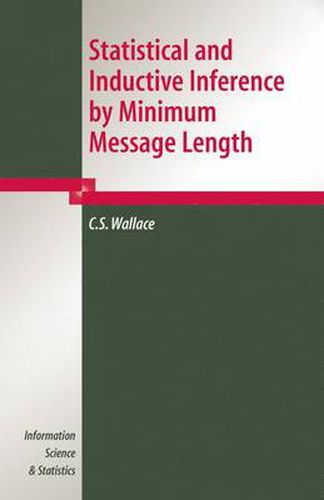Readings Newsletter
Become a Readings Member to make your shopping experience even easier.
Sign in or sign up for free!
You’re not far away from qualifying for FREE standard shipping within Australia
You’ve qualified for FREE standard shipping within Australia
The cart is loading…






This title is printed to order. This book may have been self-published. If so, we cannot guarantee the quality of the content. In the main most books will have gone through the editing process however some may not. We therefore suggest that you be aware of this before ordering this book. If in doubt check either the author or publisher’s details as we are unable to accept any returns unless they are faulty. Please contact us if you have any questions.
The Minimum Message Length (MML) Principle is an information-theoretic approach to induction, hypothesis testing, model selection, and statistical inference. MML, which provides a formal specification for the implementation of Occam’s Razor, asserts that the best explanation of observed data is the shortest. Further, an explanation is acceptable (i.e. the induction is justified) only if the explanation is shorter than the original data.This book gives a sound introduction to the Minimum Message Length Principle and its applications, provides the theoretical arguments for the adoption of the principle, and shows the development of certain approximations that assist its practical application. MML appears also to provide both a normative and a descriptive basis for inductive reasoning generally, and scientific induction in particular. The book describes this basis and aims to show its relevance to the Philosophy of Science.Statistical and Inductive Inference by Minimum Message Length will be of special interest to graduate students and researchers in Machine Learning and Data Mining, scientists and analysts in various disciplines wishing to make use of computer techniques for hypothesis discovery, statisticians and econometricians interested in the underlying theory of their discipline, and persons interested in the Philosophy of Science. The book could also be used in a graduate-level course in Machine Learning and Estimation and Model-selection, Econometrics and Data Mining.C.S. Wallace was appointed Foundation Chair of Computer Science at Monash University in 1968, at the age of 35, where he worked until his death in 2004. He received an ACM Fellowship in 1995, and was appointed Professor Emeritus in 1996. Professor Wallace made numerous significant contributions to diverse areas of Computer Science, such as Computer Architecture, Simulation and Machine Learning. His final research focused primarily on the Minimum Message Length Principle.
$9.00 standard shipping within Australia
FREE standard shipping within Australia for orders over $100.00
Express & International shipping calculated at checkout
This title is printed to order. This book may have been self-published. If so, we cannot guarantee the quality of the content. In the main most books will have gone through the editing process however some may not. We therefore suggest that you be aware of this before ordering this book. If in doubt check either the author or publisher’s details as we are unable to accept any returns unless they are faulty. Please contact us if you have any questions.
The Minimum Message Length (MML) Principle is an information-theoretic approach to induction, hypothesis testing, model selection, and statistical inference. MML, which provides a formal specification for the implementation of Occam’s Razor, asserts that the best explanation of observed data is the shortest. Further, an explanation is acceptable (i.e. the induction is justified) only if the explanation is shorter than the original data.This book gives a sound introduction to the Minimum Message Length Principle and its applications, provides the theoretical arguments for the adoption of the principle, and shows the development of certain approximations that assist its practical application. MML appears also to provide both a normative and a descriptive basis for inductive reasoning generally, and scientific induction in particular. The book describes this basis and aims to show its relevance to the Philosophy of Science.Statistical and Inductive Inference by Minimum Message Length will be of special interest to graduate students and researchers in Machine Learning and Data Mining, scientists and analysts in various disciplines wishing to make use of computer techniques for hypothesis discovery, statisticians and econometricians interested in the underlying theory of their discipline, and persons interested in the Philosophy of Science. The book could also be used in a graduate-level course in Machine Learning and Estimation and Model-selection, Econometrics and Data Mining.C.S. Wallace was appointed Foundation Chair of Computer Science at Monash University in 1968, at the age of 35, where he worked until his death in 2004. He received an ACM Fellowship in 1995, and was appointed Professor Emeritus in 1996. Professor Wallace made numerous significant contributions to diverse areas of Computer Science, such as Computer Architecture, Simulation and Machine Learning. His final research focused primarily on the Minimum Message Length Principle.